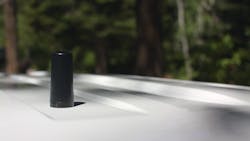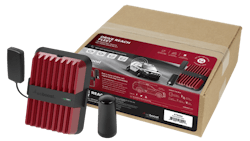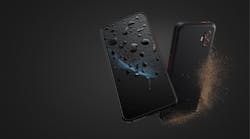Law enforcement Ranger Jason Bulkley serves as the “eyes and ears” of a remote strip of Arizona wilderness overseen by the Department of Natural Resources. During the course of a typical day, he protects a desert region stretching across four million acres, handling everything from searching for missing hikers to responding to crimes in progress and protecting ancient artifacts. Bulkley has even been called in to respond to natural disasters and traveled to Puerto Rico in 2017 to help the victims of Hurricane Maria.
As a fully commissioned peace officer, Bulkley relies on several items to ensure his personal well-being and the safety of others. These include a first-aid kit, his firearm, and a weBoost Drive Reach Fleet cellphone signal booster.
A crucial need for strong cellular signal
A cellphone signal booster may not seem like obvious standard equipment for a law enforcement ranger. However, the obstacles that most rangers are up against in their day to day duties necessitate strong cell signal.
Unfortunately, 80 to 90% of the millions of acres that Bulkley protects alone have little to no cell signal coverage. This can be problematic for rangers for a variety of obvious reasons. For example, conducting surveillance and working on investigations involve importing data and running information on a laptop, which requires an internet connection using a cellular network in order to work. Without a connection, Bulkley is unable to complete these important duties.
Rangers often need to call in to report on crimes or potential damage from disasters such as earthquakes or wildfires, to update on the status of missing hikers, or to request backup to apprehend a criminal. In a critical situation, every second matters, and the ability to call or text can be the difference between life and death. Rangers need strong, uninterrupted access to a cellular network so they are able to communicate.
In addition, the public lands that Bulkley patrols have security camera systems installed to help deter crime. The images and videos these systems record need to be accessed by cellular devices for streaming and video purposes, which also require a cell signal in order to work.
Bulkley knew he needed a cost-effective solution that would enable him to effectively and safely do his job from inside a patrol vehicle, especially since he often patrols areas alone in the remote, arid Arizona wilderness that have little to no cellular connectivity.
To solve the issue, Bulkley had a weBoost Drive Reach Fleet cell booster professionally installed and hardwired in his patrol vehicle. Immediately, Bulkley began noticing the improved cell signal. He was able to go to spots in the Arizona wilderness that had weak, minimal cell coverage and easily make a call or send a text, enabling him to better communicate.
Bulkley’s laptop benefited from the stronger cell signal, allowing him to more easily import data and work on investigations.
In addition, rangers noticed people were stealing the boxes at the self-pay stations on Bureau of Land Management property, but poor cell coverage lowered the performance of the security camera’s MiFi connection, making it difficult to view video footage. Bulkley came up with the idea to install a cellphone booster on the camera itself. As a result, now the camera can regularly send video footage back to the headquarters for uninterrupted observation.
Bulkley’s daily work life has been transformed with the installation of the weBoost Drive Reach Fleet booster. “I’m able to connect to the law enforcement network through my cellular connection,” he says. “Same thing with my ability to access the Bureau of Land Management property’s game camera. If I don’t have cell coverage, then I can’t monitor what’s going on at that location. Almost every ranger I know, just because of the locations we work in, wouldn’t have cell coverage without a booster. It really maximizes whatever coverage is there. It’s awesome.”
The box thefts at the self-pay stations on Bureau of Land Management property have also been reduced by the installation of the weBoost cell signal boosters.




